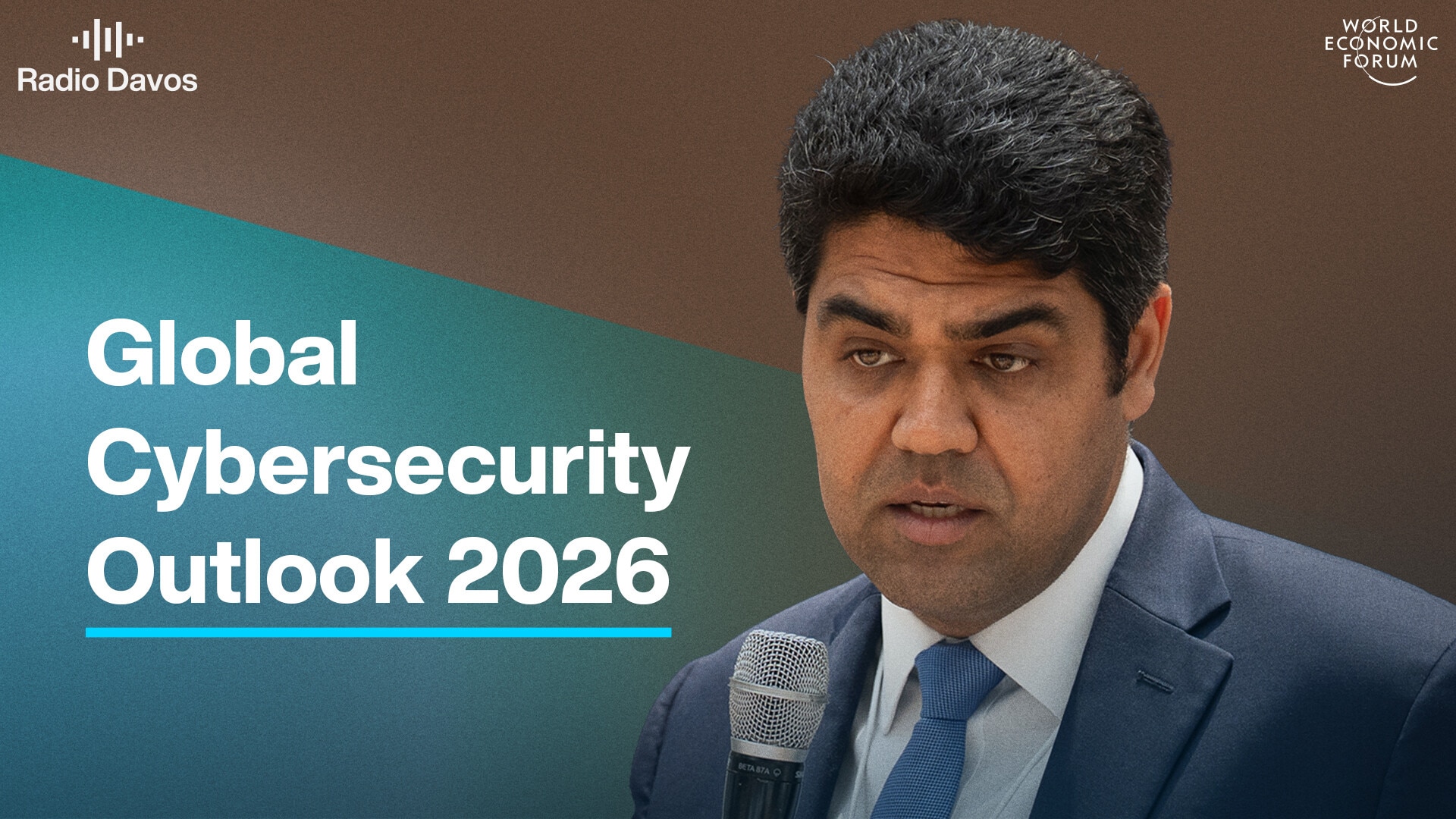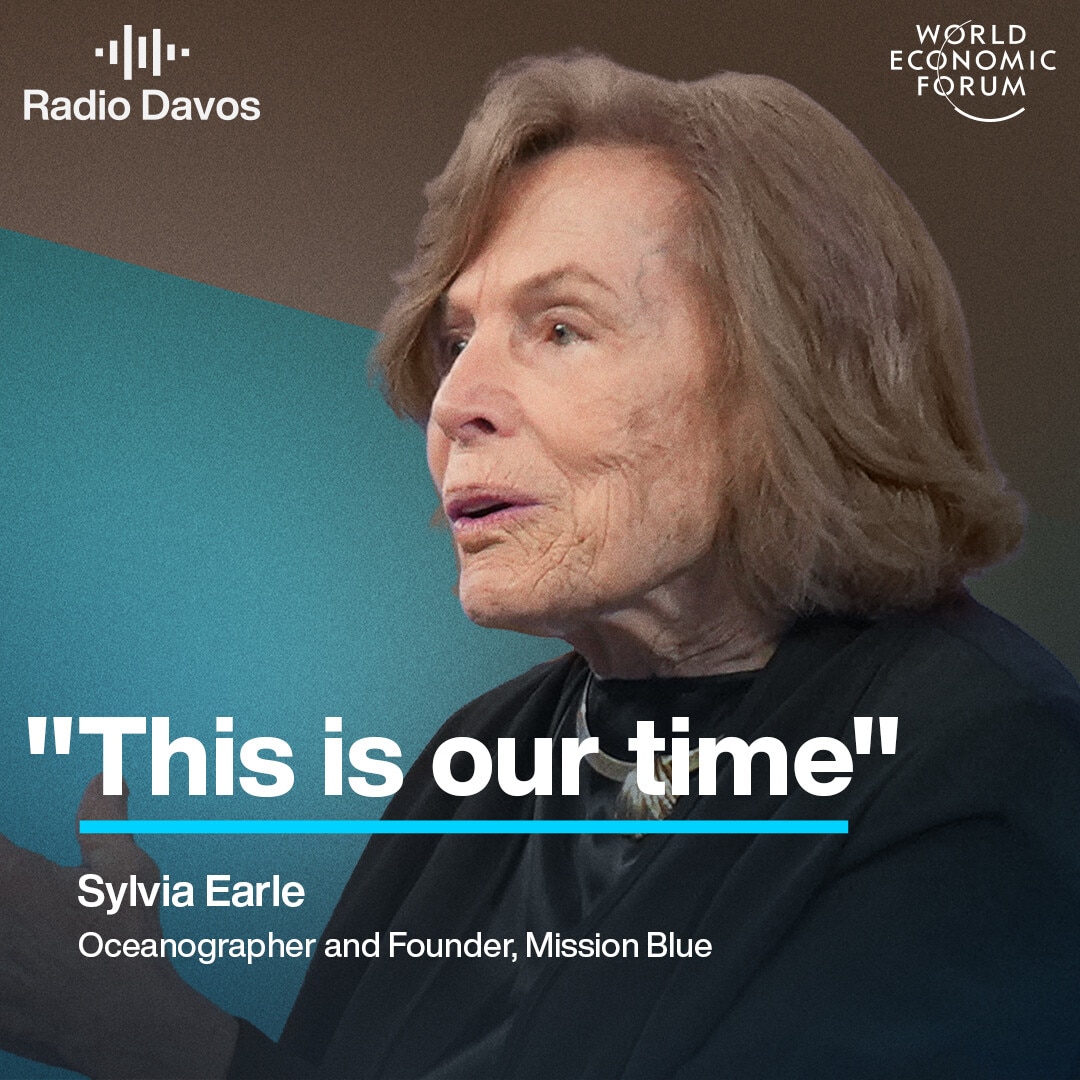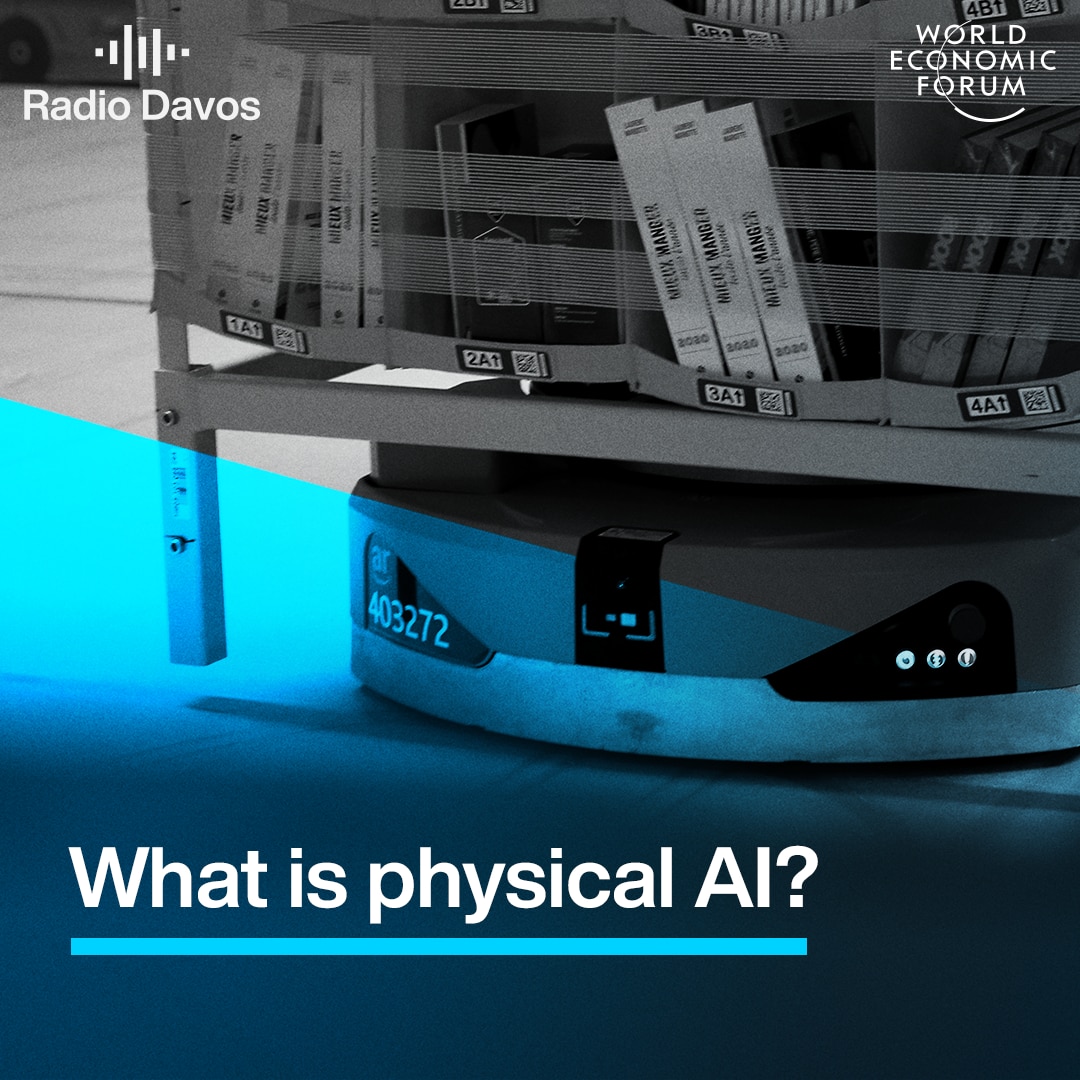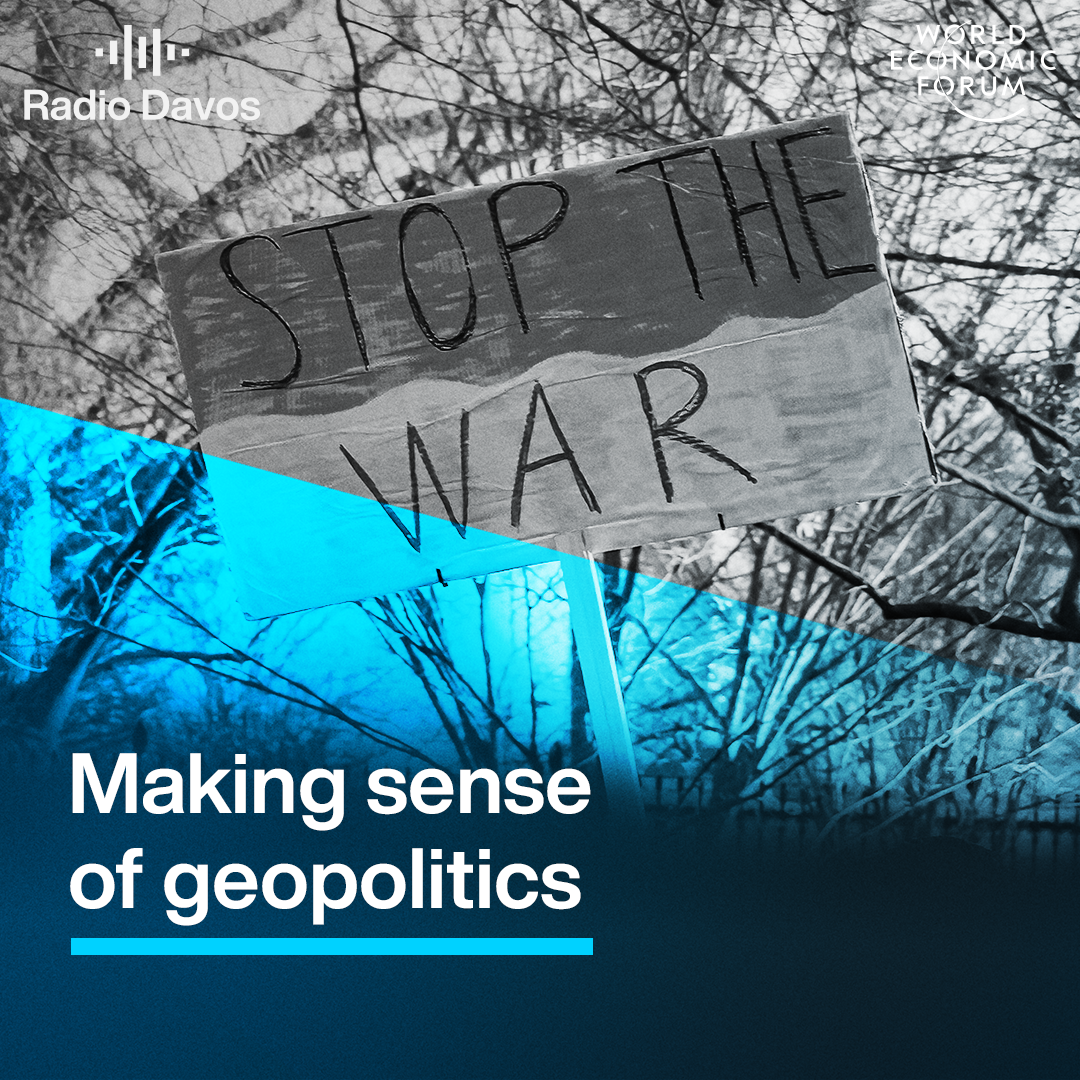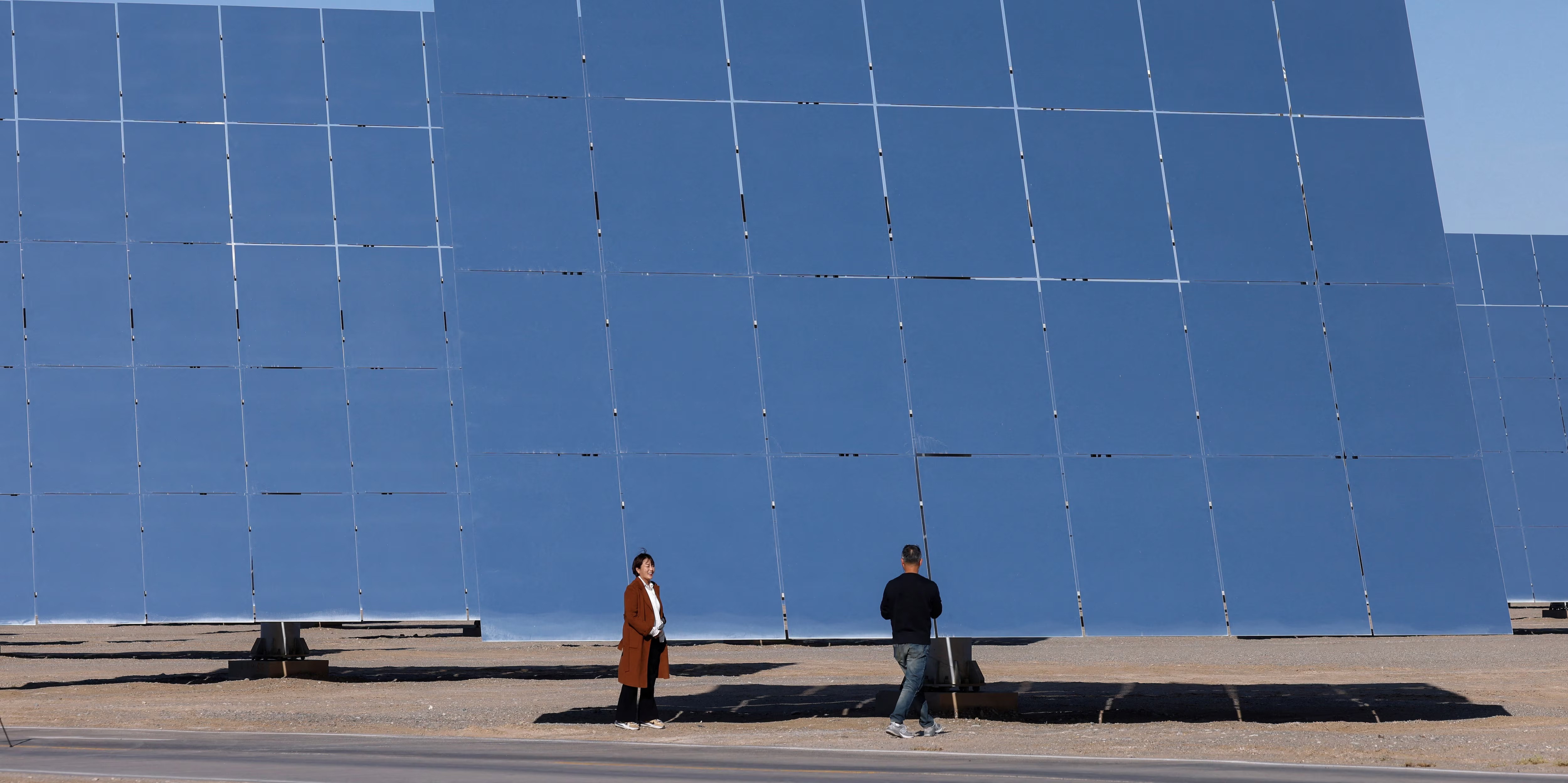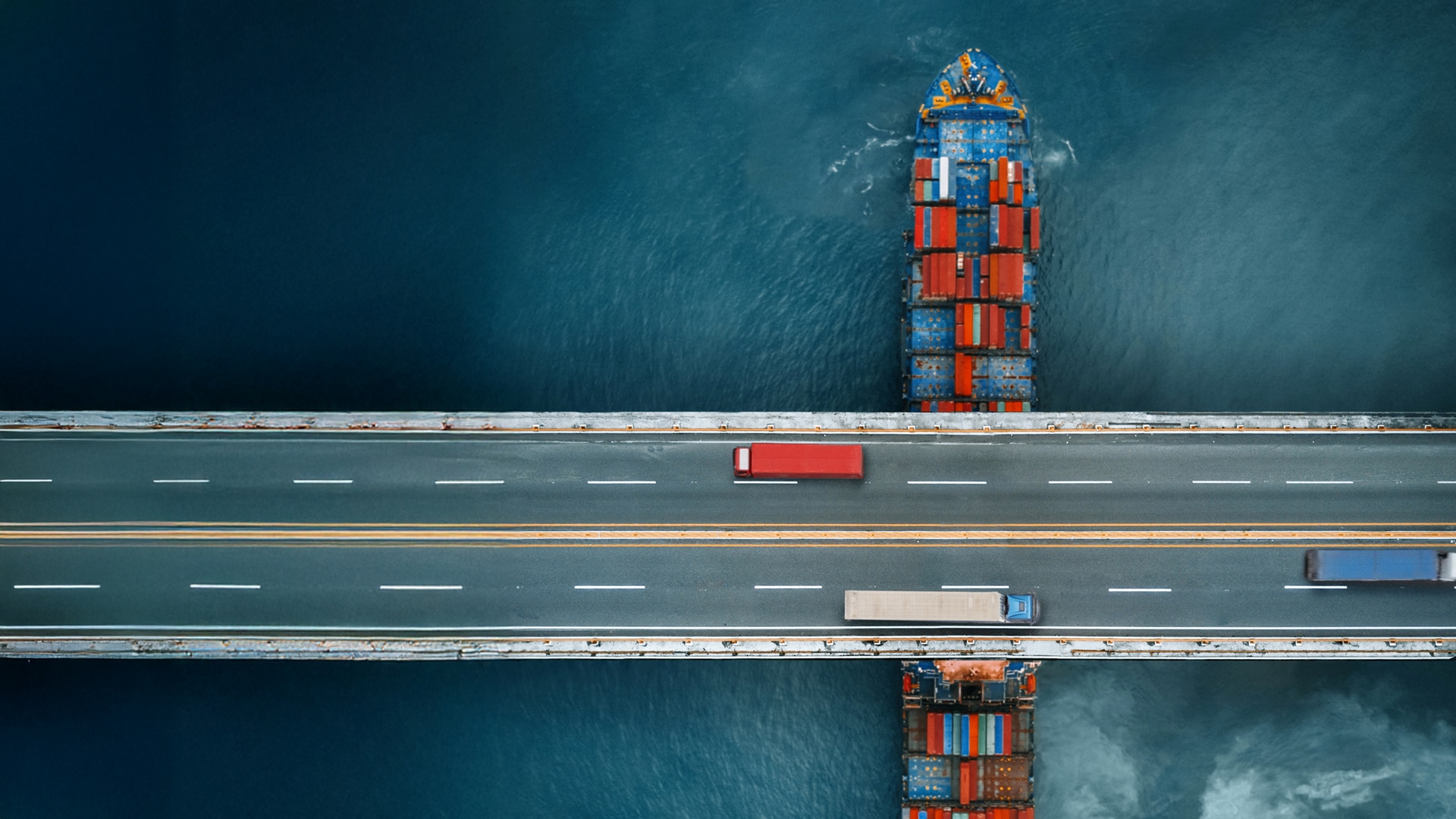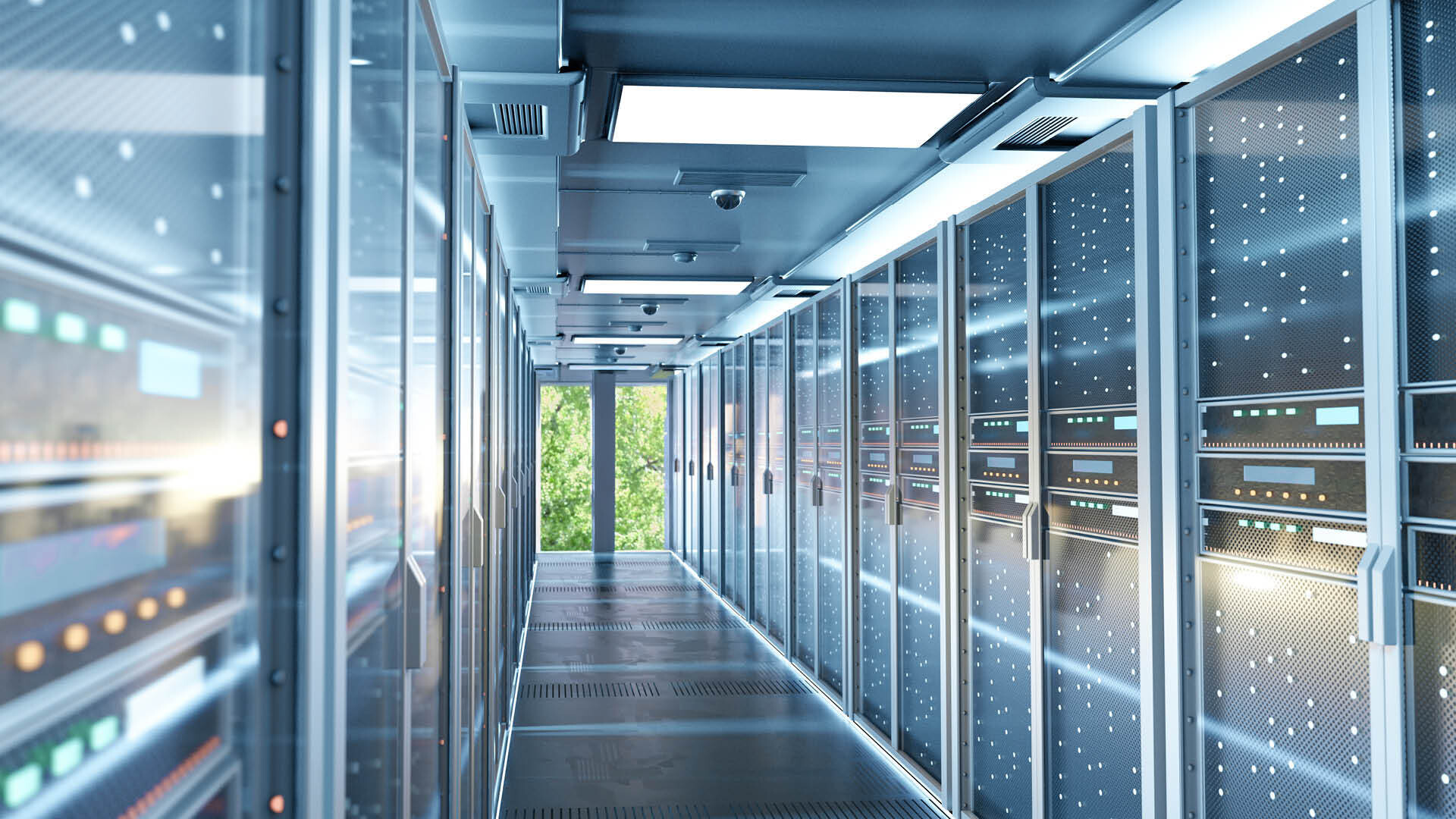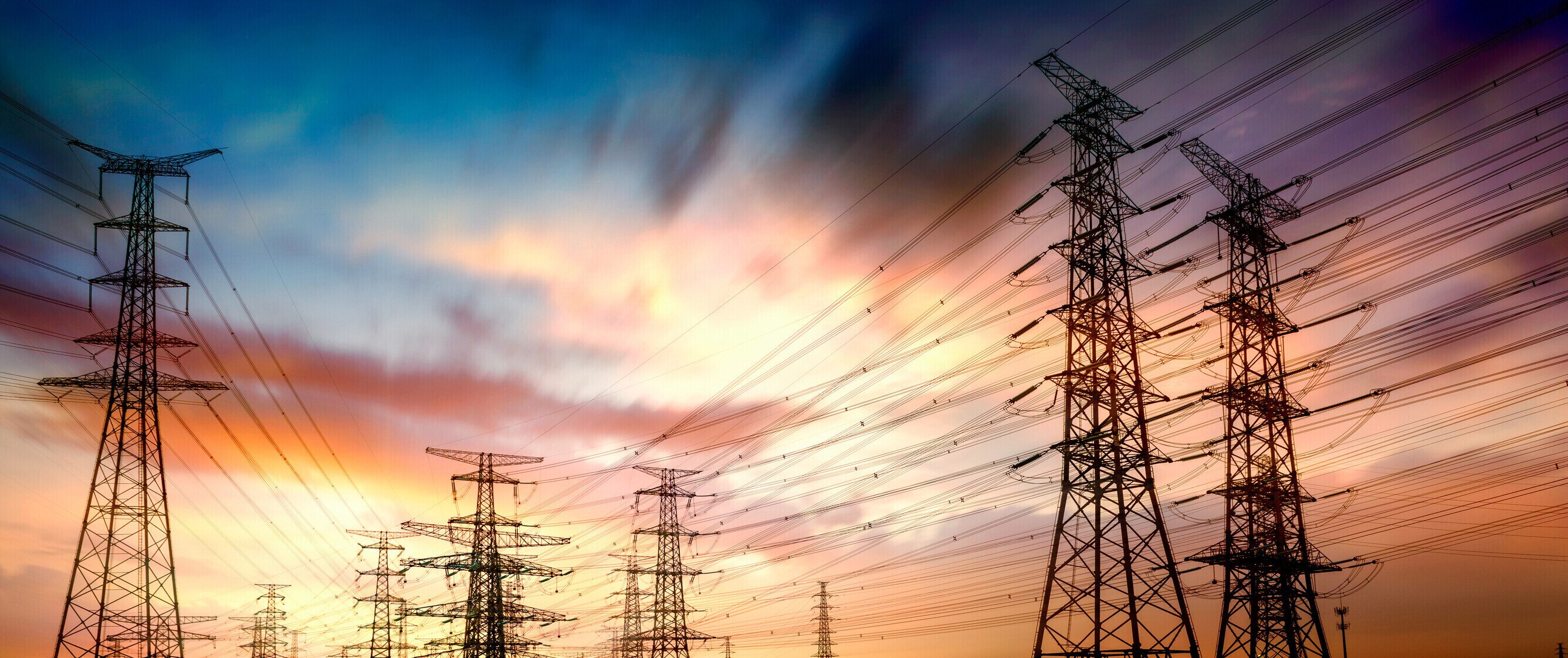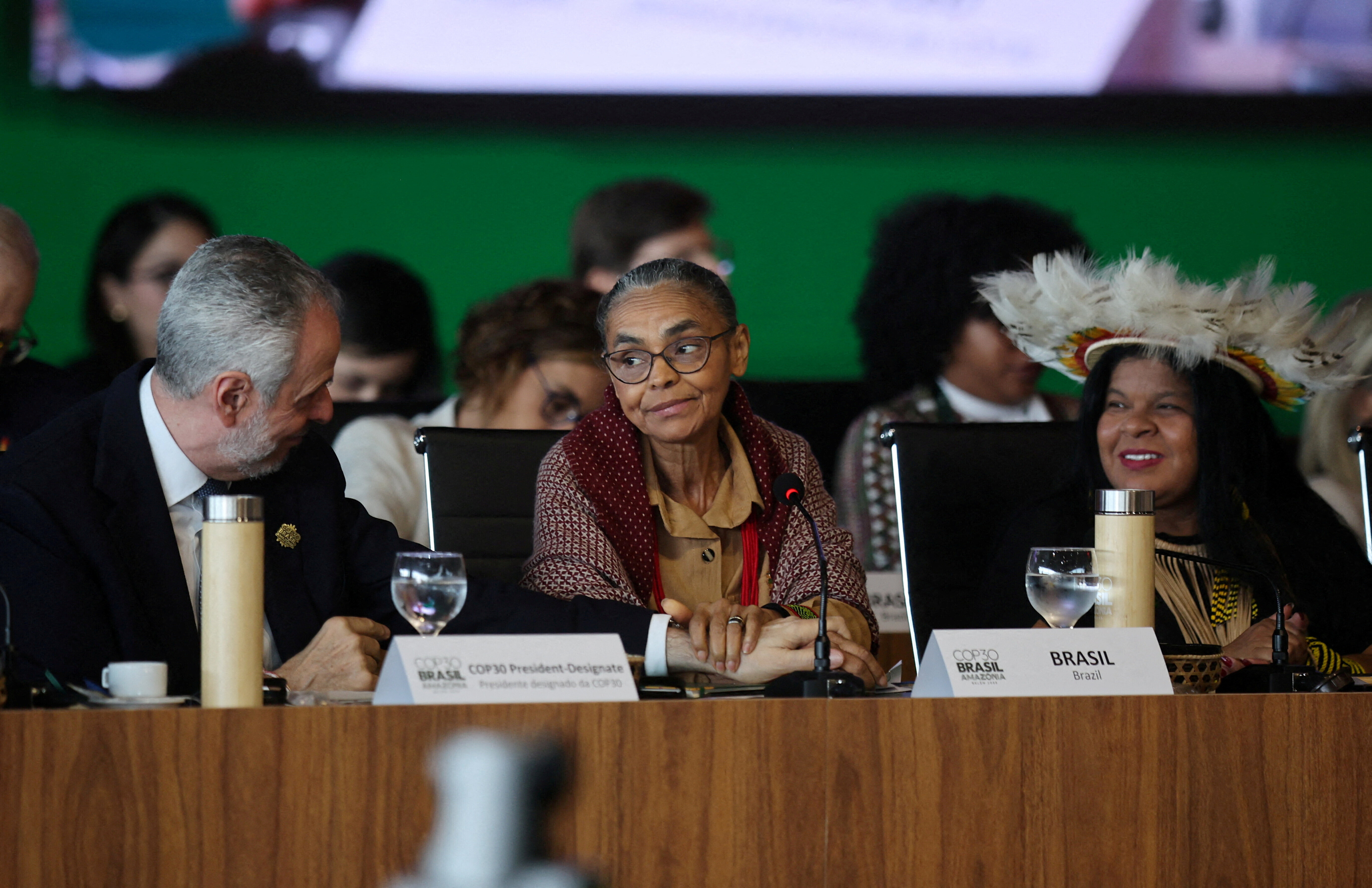Where are the innovations that can make mining more sustainable?
播客文字稿
This transcript has been generated using speech recognition software and may contain errors. Please check its accuracy against the audio.
Vivek Salgaocar, Director, Vimson Group/Prospect Innovation: Whether it's semiconductors, or cars, or cellphones or the toothpaste that you use to brush your teeth in the morning, it all depends on the mining industry in one way or the other. So if we can actually tackle these issues at the source, we're truly then greening our supply chain. I think that has very, very far reaching ramifications.
Robin Pomeroy, host, Radio Davos: Welcome to Radio Davos, the podcast from the World Economic Forum that looks at the biggest challenges and how we might solve them. This week: mining - the demand for metals is projected to increase massively - not least because of the rise of certain green technologies.
We talk to someone who is helping the World Economic Forum seek innovators creating ways to solve these problems.
Vivek Salgaocar: What we're trying to do here is pick the ones with the best technology and open doors for them, and potentially invest in them and raise the profile for them.
Robin Pomeroy: As the Forum’s UpLink platform launches a search for startups, we hear from a company that is already scaling up a solution, with better ways of recycling.
Megan O'Connor, CEO and Co-founder, Nth Cycle: Innovation and technology is the way that we're going to solve a lot of these issues.
Robin Pomeroy: Entrepreneurs like this one are mindful of the need to make the green transition - which is raising demand for certain minerals - as green as possible.
Megan O'Connor: Just thinking about the solution that we're building, one of the biggest things I don't want to happen is that we build this new energy economy on a source of materials that adds carbon to the world, into the atmosphere.
Vivek Salgaocar: If technology is able to then extract from those waste materials in a sustainable way, suddenly a waste product becomes your raw material.
Robin Pomeroy: Subscribe to Radio Davos wherever you get your podcasts, or visit wef.ch/podcasts where you will also find Meet the Leader and Agenda Dialogues.
I’m Robin Pomeroy at the World Economic Forum, and with this look at mining and how we can make it more sustainable.
Megan O'Connor: Which is kind of crazy to think about, right?
Robin Pomeroy: This is Radio Davos.
Robin Pomeroy: Welcome to Radio Davos. And on this episode, we're going underground to look at mining, an industry that many of us probably rarely think about, but one that provides the raw materials for so many of the things we use, not least the modern technologies such as smart phones and electric vehicles that require certain minerals that are not always in abundant supply.
To talk to me about mining, and particularly the environmental impact of mining and what could be done to reduce that, I'm joined by my colleague Emanuela Orsini, who works with me at the World Economic Forum on the forum's UpLink platform. Hi, Emanuela. How are you?
Emanuela Orsini: Hi. I'm well. How are you?
Robin Pomeroy: I'm very well, thank you. Just remind us before we get back into mining. What is UpLink?
Emanuela Orsini: Yes. So UpLink is the open innovation platform of the World Economic Forum. So how it works is that we run competitions that we call Innovation Challenges, where startups can submit their solution to different topic areas that are aligned with the Sustainable Development Goals. So we run challenges on water scarcity, reforestation, circular economy, food, ocean, and many more.
Robin Pomeroy: So people who are in those fields will kind of enter a competition that UpLink is running. So they'll usually be innovators who have solutions to some of these big problems, right?
Emanuela Orsini: Exactly.
Robin Pomeroy: Okay.
Emanuela Orsini: And, UpLink was founded in partnership with Salesforce and Deloitte in 2020. And since then, our UpLink community has really grown. We have almost 500 Top Innovators, which is what we call the early stage startups that are the winners of these innovation challenges.
And now we also have a community of investors who are funnelling much needed funds to these impact focused startups. And we have a variety of business partners that we work with that have supported these startups over the past few years. So this has allowed us to really create what we call innovation ecosystems with within the different topic areas that really support the startups, and scaling up and growing and helping them create, you know, a positive impact in the long term.
Robin Pomeroy: Well, we've covered a couple of those UpLink challenges in the past on Radio Davos. People can go back and listen to that. But your latest challenge is about today's topic, mining. Could you set out what's the problem, what's the challenge or the challenges that you're looking for solutions for in this UpLink challenge?
Emanuela Orsini: Yes. So we're focusing on the mining industry now, as you said. And the big challenge that our planet really is facing is the increase in demand for steel, aluminium and metals like copper, lithium, cobalt, nickel. So these metals are essential for clean technology, such as electric vehicle batteries, solar panels and wind turbines.
And the International Energy Agency predicts that the demand for these minerals will double by 2040. So with this huge increase in demand, there's obviously a question on how we're going to extract and process these metals and how can we do this in a more energy efficient and sustainable way.
Robin Pomeroy: Right. So that I mean, that's quite a figure, to double from today's mining. Whatever amount is being pulled out of the ground today will be twice as much in, what, 15 years?
Emanuela Orsini: Yeah. That's huge. So, you know, we do have the sustainable development goals that were set, that we need to reach by 2030. But also we have the International Energy Agency goals in reaching net zero emissions by 2050. So it's really important. It's a really important challenge that we really need to tackle, to reach those goals.
So in order to to to tackle this, we need new solutions, really to make the mining industry more energy efficient and sustainable for this energy transition. So, so that's why we're launching the Sustainable Mining Challenge. And we're really looking for innovative and groundbreaking tech solutions from early stage startups across different sectors and industries. So not only the mining industry, and these solutions really need to reduce the energy consumption and minimise the overall impact, throughout the mining lifecycle. So from the discovery phase to the development and extraction all the way to the post mining phase.
Robin Pomeroy: Okay, so if anyone is listening to this and is has amazing technological solutions to those problems you've just mentioned, they should seek UpLink on the internet. We're going to hear from an entrepreneur who's come up with a potential solution to one of these problems, later in the show, that you interviewed.
But before that, we that we're speaking to someone who's also interested in finding these entrepreneurs. Tell us about this first interview.
Emanuela Orsini: So I spoke with Vivek Salgaocar. He is the founder of Prospect Innovation, which is the leading funder and business partner of the Sustainable Mining Challenge on UpLink. And just as a side note, we'll be launching another four innovation challenges on this topic area with them over the course of the next three years. So stay tuned.
So Vivek is also the director of Vimson Group, and it's a third generation family owned mining company in India. And they operate iron ore mines, which is the primary raw ingredient in steel.
So coming from that mining background, Vivek decided to start Prospect Innovation and really focus on how technology and innovation can help the mining and metal sector transform in the future.
So, they support startups, innovators and researchers working on solutions that will help the sector become more energy efficient and reduce its environmental impact in order to meet these net zero goals.
So let's hear more from him and how he's supporting this mining challenge.
Vivek Salgaocar: The mining industry is an industry that's been around for several centuries before us and will be around for several centuries afterwards. And, the fact of the matter is, no matter what it is that we're building, we need the mining industry to contribute towards those raw materials.
And so the challenges that we're facing now, actually, is a challenge that really faces the world as we know it, because if we want to fulfil the goals that we've set ourselves and the targets that we set ourselves to decarbonize for the energy transition, to go green, etc., we need to make sure that we have the minerals and metals necessary to actually enable that transition.
And if we look at the way in which we're going right now, we simply do not have the capacity to actually meet those goals just because the output that we currently have is just not sufficient.
So in terms of, you know, the challenges that we have, it's how do we actually maximize the amount that we can produce in a way that is sustainable?
The issue is that because we've been mining for so long, the quality of the deposits of ore, or the ore bodies, as we call it, has gone down because the easy to mine stuff has been already extracted. So the question is, how do you do that in the most sustainable way?
And I believe very strongly that it's technology that can play one of the biggest roles in actually being able to solve that, because if we're able to actually extract in a much more efficient way, that suddenly changes the game in terms of how much of an impact we have on the environment, as well as how much of a social impact we have, which is equally important.
Whereas if we continue as is, that's going to be difficult because the targets that we have set ourselves are quite, quite lofty and rightly so, because we need to, you know, to change the way things are done.
However, it has to be a multi-pronged approach. And I think, technology is one of the biggest aspects of that, you know, multifaceted approach that that can actually take us there.
Emanuela Orsini:. So tell us more about the opportunities that we could have with technology.
Vivek Salgaocar: Given the size of the undertaking, in terms of what we've set ourselves as targets, that obviously means that we need to change the way things are done, and that means that there have to be solutions that do not currently exist.
And if those solutions are brought into place through technology, I'm not saying that's the only way, that's one of the ways ,that just the main way that we focus on at Prospect Innovation. Naturally, given the size of the undertaking, we're going to have an equally large sized opportunity in terms of being able to have financial outcomes that are commensurate to that.
So if we look at, as I was mentioning earlier, take, for example, diminishing quality of ore bodies. If now we're able to mine at say lower depths, without having as big of an impact, that's certainly going to change the game. And again, the people that are able to do that are going to be very, very successful financially as well as being able to actually supply the materials needed for this transition in a just and environmentally friendly way.
Similarly, if you talk about opportunities, one of the big issues with the mining industry has been how best to valorize tailings or overburden or waste, depending on how we want to define it. But essentially what that means is that when you're mining, you typically have a significant amount of what is determined to be overburden or waste products because it doesn't meet the threshold of what it is that you're trying to mine.
And over decades this material has been stacked or set aside all over the world. And as a result, you have billions of tonnes, literally, of this material that is available. And suddenly if technology is able to then extract from those waste materials in a sustainable way, suddenly a waste product becomes your raw material.
What that means, then, is that you limit the amount of fresh extraction that you need. You limit the amount of geopolitical risk that you have because you're not then dependent on certain countries, because you can suddenly now extract the materials that you need from these overburden or waste stacks that exist all around the world. And then you're also massively, reducing the amount of your carbon footprint by not having to ship it all over to process it and then to get to the end user, etc..
So I think the opportunity, these are just a couple of examples that I've given, but given how many industries depend on mining, I think the opportunity then is also equally large and is equally multifaceted.
It's also something that exists across the world. It's not concentrated to any one specific region. It's not concentrated to any one specific type of mineral or metal. And that just goes to show you how big the opportunity is.
Which is also, unfortunately, then surprising, given how much money has actually gone towards innovation and technology in mining, which is, very, very small. Especially when you compare it to other industries.
Emanuela Orsini: So why do you think there hasn't been that much focus on the mining industry in terms of innovation yet?
Vivek Salgaocar: So I think overall the mining industry has been slow to adapt over the years, but that's changing. And I think that's that's a very good sign. Not just for the industry, but for the world at large.
I think if you see what's happened just in the last, say, five years, it's been much, much more that's happened say in the preceding 25.
If you look at also, unfortunately, what's happened in the past is there's been this stigma around mining, because it's an industry that has worked sort of quietly in the background, enabling essentially all the other industries, but hasn't really been very vocal about the work that it's been doing.
What we want to do is really look forward in terms of being able to actually be at the forefront of innovation and technology and bring the brightest, and the best entrepreneurs, around the world to be looking at solutions for the mining industry.
Because as of now, you don't really see much in terms of innovation and early stage technologies for the mining industry exclusively.
And that needs to change because ultimately, although the stigma is, I think in large part, what drives, you know, our brightest and best young engineers and technologists away, I think if you break down what actually is needed for the industry, it's actually the same exciting technologies that people are working on across the world, right?
Whether it's AI, or machine learning or robotics or drone technologies, or radio waves, etc. All of those have a very important part to play in terms of improving the state of the mining industry. It just has to be looked at in the right way. And the use case has to be broken down, which is what it is that we're hoping to do.
So at Prospect, and Prospect being around, for about five-odd years, and that's primarily what we've been trying to do, is work with entrepreneurs and work with startups to explain what the actual problems and use cases are for the mining industry, so that the exciting technologies that they're working on, not necessarily in the mining industry, but definitely relevant to the mining industry, can then be adapted and brought in, so that we can we can then take them to market, and really elevate them and have them implemented, through pilots and interaction, etc. within the industry.
What we hope to achieve through the partnership with the WEF and UpLink is really take it to the next level because in terms of reach and brand value, there are really few, if any, platforms out there from a business standpoint, that have the reputation and the reach of the World Economic Forum.
And what we hope to do is really get these problems at a stage where the they hit the maximum number of eyeballs so that the maximum number of people can actually work on solving these really pressing issues. Not just for, the benefit of the mining industry, but I think and I truly believe that if we can solve these issues for the mining industry, we're actually solving these issues for the, you know, for industry at large. Just because of how much, all of these industries really depend on the mining industries for the for the building blocks of whatever it is that they're doing, whether it's semiconductors, or cars, or cell phones or the toothpaste that you use to brush your teeth in the morning. It all depends on the mining industry in one way or the other.
And so if we can actually, you know, tackle these issues at the source, we're truly then greening our supply chain. And then I think that has broad and very, very far reaching ramifications.
Emanuela Orsini: And so let's talk about the first sustainable mining challenge launching this week on UpLink. What types of solutions are you looking for?
Vivek Salgaocar: Sure. So, you know, we're super excited to announce the first challenge. It's going to be the first of several. And for the first challenge, what we wanted to focus on is really the energy efficiency of the mining industry and how we can really tackle that in the best possible way.
I think energy efficiency is something that cuts across industries. It's not just exclusive to mining, which is why we thought it would be a good place to start because it's universally relevant and universally applicable.
So in terms of what we hope to achieve, or the types of solutions that we hope to attract, in this challenge, it's really quite varied. It's everything, from ways in which we can actually use less energy to extract what it is that we're looking for.
It also means using less energy or alternative sources of energy for transportation and logistics, because once things mined, they have to, of course, move around.
Similarly, it's looking at energy efficiencies in the processing of those materials.
It's looking at energy efficiencies in terms of how then you could look at new potential sites to mine, because one of the biggest uses of resources right now in the mining industry is the exploration part.
And if we can, find solutions that do that in a much more energy efficient way, you're again tackling, you know, one of the biggest uses of energy for the industry.
Emanuela Orsini: Okay. And what will the winners get out of the upcoming programme once they've been selected?
Vivek Salgaocar: The winners have a tremendous amount to gain from this.
One, of course, just the, you know, the honor of being selected amongst a pool of a significant number of applicants that we hope to hope to attract is tremendous.
Further, there's of course, always the possibility of investment in these startups, which ultimately is going to be needed for them to grow and scale. Those investments could come from us. They could come from our ecosystem partners. They could come from folks who are not at all linked to this challenge at all, but who see these startups and see the challenges again because of the broad reach of the Forum.
Beyond that, you also then immediately have access to, you know, the resources and the network of both Prospect as well as, the Forum. And I think that is, is a tremendous step up for a startup, because if you're building a technology somewhere which is super exciting, you need everything that you can get to take it to the next level.
And oftentimes what we see is that getting the right connections and having the right doors open is the difference between a successful startup, and an unsuccessful one, not necessarily ones that have the best technology or not.
So what we're trying to do here is pick the ones with the best technology and open doors for them, and potentially invest in them and raise the profile for them.
Robin Pomeroy: Vivek Salgaocar, director of the Vimson Group and Prospect Innovation.
So, Emmanuela, Vivek is helping you seek out the entrepreneurs, the startups coming up with these new ways of doing things that can address some of the sustainability challenges associated with mining. And now we're going to hear from an entrepreneur that is doing that. Tell us about this other interview.
Emanuela Orsini: Yes. So, I spoke with Megan O'Connor. She is the CEO and co-founder of Nth Cycle. They're an American startup. And they're also an ecosystem partner of the UpLink Sustainable Mining Challenge. They were actually funded and also supported by Prospect Innovation in the past. So they're going to help they've helped actually design the focus areas of this challenge, but they'll also help select the winners of this challenge.
So let's hear more about Nth Cycle and their innovation.
Megan O'Connor: So Nth Cycle is a sustainable refining company. And so what we've done is develop a new way to refine the critical minerals that we use in all of the products, like wind turbines, solar panels, electric vehicles. Really trying to redefine what this refining supply chain looks like so that we can do it domestically and much more sustainably over time.
Emanuela Orsini: And what was the inspiration behind starting this company, for you?
Megan O'Connor: We started the company back in 2017, actually. And this was, this technology, was part of the work I did as a PhD student, to develop the technology for my dissertation.
And it was sort of a combination of different events that I think, was part luck, that I had this all happen at one time.
But I met my co-founder, Chad Vecitis, who was a full time professor at Harvard at the time, and he's actually the original inventor of this core tech that we now use at Nth Cycle.
The other thing that happened was he was giving a presentation on the technology, and I was just happened to be there and thought like, wow, this guy has developed something really cool. He's super smart. But didn't really think much else of it at the time.
Flash forward three months. I found myself able to join what was called a Green Electronic Summit. And so folks from Dell and Apple, and sort of the consumer electronics companies were all in a room talking about the sustainability issues they saw coming down the line over the next 5 to 10 years.
And over and over and over again in that room, I kept hearing the same thing from, from no matter what company was talking. You know, one was, we're not going to have enough supply of these critical minerals to really transition and think about the small amount of materials that we use and things like cell phones and laptops, you know, EVs use orders of magnitude more cobalt and nickel, for example.
And the other issue paired with that is, you know, how are we going to manage all this waste at it's end of life. We have all of these devices. EVs are just a much larger form of electronics waste. And I don't think a lot of people realize that. And we have no way of really managing any of that material when it comes off the roads or, you know, when solar panels come down.
And so I walked to that meeting feeling really inspired to try and figure out a way to sort of kill two birds with one stone of a how do we take all of this waste and these underutilized assets and turn them into something usable for the supply chain? And that's really where the idea of taking, you know, I thought back to Chad's cool technology in the presentation I saw him give at that conference and I said, like, I wonder if this could work for this application.
And so I talked to him, you know, I talked to my own PhD advisor, who helped me think through this idea. And we basically said, okay, I'm going to do this for the rest of my three years here in my PhD.
And, you know, after many iterations of it not working, we finally got it to work. And, you know, when I was, you know, facing graduation, I decided to take it out. I felt like there was, a really good chance of success in terms of commercializing this technology.
And the need for it was so strong, even, you know, three years later, I felt even more motivated to try and solve this because I really felt that technology, and innovation was really one of the only ways we could truly change the way that we refined these critical minerals for the energy transition.
Emanuela Orsini: So tell us a bit more about the technology and how it works.
Megan O'Connor: So we call our technology the oyster. And we're here in Boston. So it is a sort of tied to where we're from as a company. And oysters take, you know, lots of things off the ground in the ocean floor, all the garbage, and turn them into pearls. And so that's why it's called the oyster.
But the technology itself, it really works, with electricity. And so you can think about it as an electrified or electrochemical system. So we're producing the same chemicals you'd see in traditional refining, but producing them with electricity. And so that's how we're able to really get the significant reduction in greenhouse gas emissions compared to the way you traditionally refine things.
But at its highest level, I like to think about it as a Brita water filter. So if you have a Brita water filter, you have that carbon cartridge that's in there. When you pour your drinking water through that carbon cartridge, all of the metals that could be in there sort of get caught in that one filter. So it's very nonselective, but it removes all those materials.
We took that same basic idea. Okay. If you have this filter media, and you're trying to get these metals out, can you do it more selectively? And so by applying an electrical current to that porous surface that we have inside of our electrochemical cells, we're able to pull out one metal at a time. So it's very selective.
So you can imagine, we have several oysters that are in series, you know, one we have at a specific, you know, voltage to maybe pull out copper, the next one to pull out nickel, the next one to pull out rare earths. And so that's sequentially how we're able to pull out all these different materials.
And because we're using electricity to produce the chemicals, it allows us to have a much more modular, scalable system. So instead of having to build out one large centralized facility where you use traditional chemicals, we can shrink that footprint and that size to actually go to where our partners are.
So, I forgot to say at the beginning, the people that we partner with are people who are recycling. And so recycling is really like logistics and shredding. So think they collect batteries, they collect different industrial scrap materials like alloys,or anything from the steel industry. And then we work with mining companies as well. So folks that might have assets that can't get permitted or they're too small to justify putting a big refinery next to it. Right? Those are the types of players that we're trying to work with to help to enable them to refine these materials.
And so we go right on site with those folks, and we bring our oyster units and we process that material for them.
Emanuela Orsini: How does it help with the increased demand for metals and minerals? How is it different to what was being done beforehand?
Megan O'Connor: Great question. So the way that metal refining works today, is really, in the mining industry we have these very large mines, you know, we're here in the United States and typically overseas you'd have a mine and you'd you'd build this large chemical or metal refinery right next to it. So it was really dedicated to that asset.
So for folks in the United States, when you have recycled materials, the model has been you collect all these materials and then you typically had to ship them overseas to these refineries that would process it as part of the mining ore that they're processing as well. So it's sort of an add-in to these refineries that exist today.
And so obviously that causes a lot of issues. Not just from a greenhouse gas perspective. So think about trucking all that material back and forth. I mean, it can take, you know, six trips around the world before it's ready to be used, which is kind of crazy to think about. Right? And the wrong way we want to go in this energy transition. And then it's also a national security issue. We want to make sure that we have a secure supply for whatever country you're in.
And so that's really what our technology is trying to solve is instead of having to ship all these materials really far distances to be processed, we can bring that refining capacity right to that recycler or that smaller mining company here in the States to be able to process right on site.
And so, again, we're not on the logistics side. We're not a mining company. You know, we're really just bringing that new technology so that they don't have to ship it overseas to be processed into something usable again.
Emanuela Orsini: How long have you been operating now?
Megan O'Connor: So this is our seventh year. And so, we started in 2017, and this year we're commissioning our first commercial facility, which is here in the States, in Ohio, which we're very excited about.
Emanuela Orsini: And what else do you need in order to scale even further?
Megan O'Connor: So some of the major things that are on top of our mind right now are partners. We're always looking to to partner with more folks, whether it's in the recycling space or in the mining space. Having them understand the refining technology and really embrace that change in industry, I think, will be really critically important for real change to happen.
Aas well as the financing. We have a very unique model. We're we're very infrastructure heavy. We're trying to deploy our assets on folks' sites. And so we are funding that deployment process. And so, really working with different folks about creative ways to finance first of its kind type facilities, is something that we're thinking about constantly.
Emanuela Orsini: Can you talk a bit more about what kind of role startups like yours and innovation in general can play, within this energy transition?
Megan O'Connor: Absolutely. I think, you know, all the different startups that are in our ecosystem are all playing a really critical role. I think innovation and technology is the way that we're going to solve a lot of these issues. Like just thinking about the solution that we're building, one of the the biggest things I don't want to happen is that we build this whole energy, this new energy economy on a source of materials that that adds carbon to the world, into the atmosphere. We want to make sure that the solution that we're developing is sustainable. You know, as we've always imagined it should and can be.
And so I think all of the startups that are working out there are all hyper-focused on their own specific areas to try and solve issues like this, to make sure that this transition can happen. And it's as sustainable as we want it to be.
Emanuela Orsini: So Nth Cycle is a supporting partner of the Sustainable Mining Challenge on UpLink. So can you tell us a bit more about why it's important for a startup like yours to be involved in this initiative. And then maybe you can tell tell us why other startups should apply to the challenge.
Megan O'Connor: Absolutely. We are so excited to be a part, and a partner, for this challenge.
I think the perspective that we bring is what do startups really need at at this stage at all the different stages of building not just a company but hard technology. What are we looking for in partners? What are partners looking for from us?
And so just bringing that perspective to the table to make sure that this is beneficial for both sides.
And so I think all startups who are in this space should absolutely apply. I think the resources and connections that this will bring to all the different startups who end up winning this challenge, it's going to be game changing.
I think one of the challenges and things that were top of mind for me a couple questions ago, right, like having these partnerships is how you're going to succeed, having these clients and really understanding what they're looking for, is so critical and the earlier you can have those conversations and really develop those relationships the better.
And so I encourage, you know, all startups in this space to, to apply because I think it's going to be, you know game changing and super helpful for the growth of your company.
Robin Pomeroy: That was Megan O'Connor CEO and co-founder of Nth Cycle. That's n-t-h-cycle. Emanuela, so you've set out the mining challenge that is happening now, has it started right now?
Emanuela Orsini: Yes it has, it's launched. And if you want more information, head on over to uplink.weforum.org to learn more about the challenge, including the focus areas. And as mentioned, we're looking for tech startups from different industries, to really apply for this challenge. And you have until May 29th.
Robin Pomeroy: May 29th, 2024. Emmanuela, thanks very much for joining us on Radio Davos.
Emanuela Orsini: Thank you Robin.
Robin Pomeroy: That website link again: uplink.weforum.org.
The World Economic Forum is hosting the Special Meeting on Global Cooperation, Growth and Energy for Development on 28-29 April in Riyadh, with over 700 leaders from business, government and academia attending to address the challenges posed by an increasingly fragmented geopolitical and economic environment. Find out more information at wef.ch/specialmeeting24 and across social media using the hashtag #specialmeeting24.
And for more podcasts, go to wef.ch/podcasts - and you can find Radio Davos on any podcast app, including YouTube - please subscribe and give us a rating. And join the conversation on the World Economic Forum Podcast club -- look for that on Facebook.
This episode of Radio Davos was written and presented by me, Robin Pomeroy, with Emanuela Orsini. Studio production was by Taz Kelleher.
We will be back next week, but for now thanks to you for listening and goodbye.
Scroll down for full podcast transcript - click the ‘Show more’ arrow
Mining, an industry that many of us probably rarely think about, but one that provides the raw materials for so many of the things we use, not least the modern technologies such as smart phones and electric vehicles that require certain minerals that are not always in abundant supply.
The International Energy Agency predicts that the demand for minerals will double by 2040. So how can we meet that demand in the most energy efficient and sustainable way?
UpLink, the open innovation platform of the World Economic Forum, is inviting entrepreneurs who have answers to that question to take part in its Sustainable Mining Challenge - a competition that aims to pick the most promising startups in the field.
On this episode we speak to Vivek Salgaocar, the founder of Prospect Innovation, which is the leading funder and business partner of the Sustainable Mining Challenge, and to Megan O'Connor, CEO and Co-founder of Nth Cycle, a company which is innovating in ways to better recycle mining waste.
This podcast is published around the World Economic Forum's Special Meeting on Global Collaboration, Growth and Energy for Development. Find more information at wef.ch/specialmeeting24 and across social media using the hashtag #specialmeeting24.
Links:
UpLink Mining Challenge:
Related podcasts:
Check out all our podcasts on wef.ch/podcasts:
主持::
分享:
更多集:
每周 议程
每周为您呈现推动全球议程的紧要问题(英文)
更多关于 能源转型查看全部
Ma Li and Charles Bourgault
2025年12月20日


